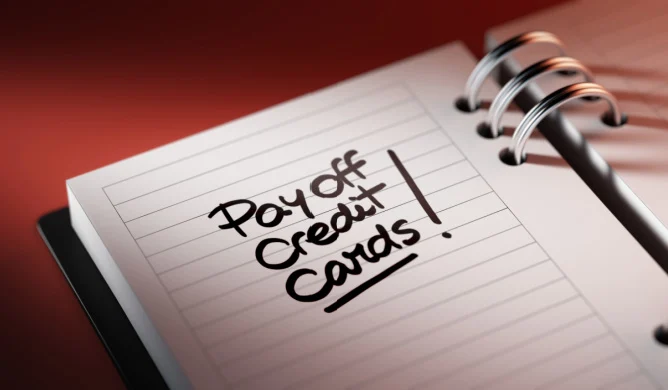Time to read : 3 Minutes
Clearing debt can seem headache inducing but, as interest rates rise, it’s a practical way to reduce your ongoing expenses. And it will help you create surplus money for savings, rather than spendings. When it comes to clearing credit card debt, some simple steps can make a positive difference to help you clear your credit card debt faster.
Pay on time
Paying your monthly repayments on the due date – or before if possible – is always recommended as it helps you avoid those extra fees and charges that can make reducing credit card debt feel virtually impossible.
And if you are still saving up for a bigger goal, such as the deposit for your first home, it’s in your best interests to get rid of other debt quickly and keep your credit rating looking its best.
Consider setting up a direct debt so the payment whizzes out of your bank account each payday and straight onto your credit card. Or, set up a reminder in your calendar to pay your credit card bill the day before it’s due.
Pay as much as you can – and stick to it
Always pay more than the minimum repayment. The higher your repayments are each month, the faster your credit card debt will disappear. It’s a simple equation but, in tough economic times, as many household bills – including energy bills, rent, and mortgage repayments – are going up, managing your money can be challenging.
By creating a realistic budget that tracks all your incomings and outgoings, you’ll be in a better position to understand how to trim certain expenses, or even try to find ways to bring in extra income, as needed.
Seek the support of a financial counsellor
If you have multiple credit cards and other debts, consider talking to a financial counsellor, and explore whether debt consolidation could be a helpful option for you. The National Debt Helpline is a good place to start to find support in your local area.
Get rid of multiple credit cards – one at a time
If you have multiple credit cards, the best way to get rid of your credit card debt quickly is to get rid of them, one at a time.
By tackling the card with the smallest debt first, you will see a positive outcome that will help you stay motivated to keep going. Once you’ve paid that off, pick the next debt to tackle, and so on.
It’s important to note that this is one strategy and not everyone may agree that it’s best. For some people, the psychological win of seeing one debt completely disappear is huge. But, if you have a credit card with a huge bill and a high interest rate, it may be best to tackle that first. A financial counsellor can take your budget into consideration to give you the best advice to suit your situation. But whatever you do choose, cancelling the card once the debt is clear is critical.
Reduce your credit limit
If you are already in trouble with too much credit card debt, reducing temptation to spend is another positive, proactive step. By getting your credit limit reduced as you pay the balance down, you avoid the temptation to spend more.
Shop around for a better credit card deal
There are pros and cons to debt consolidation, and it’s important to understand whether getting a credit card balance transfer will create savings or actually cost you more. Before you take on a new credit contract, seek the advice of a financial counsellor to ensure you are not trading one existing deal for a worse one.
The bottom line
If you feel you are drowning in credit card debt, it can be overwhelming, but there is a way out with the right financial support and advice. At the heart of any successful plan to save and reduce debt is a solid budget. Do one. Now.
Having a clear budget shows you what you have to spend and how you might be able to reduce that spending. And it matters. Because even though adding a few extra dollars to your credit card repayments may not seem like much, it will make a difference.
Go deeper: Is it worth refinancing your car loan?
Financial disclaimer
The information contained on this web page is of general nature only and has been prepared without taking into consideration your objectives, needs and financial situation. You should check with a financial professional before making any decisions. Any opinions expressed within an article are those of the author and do not specifically reflect the views of Compare Club Australia Pty Ltd.
